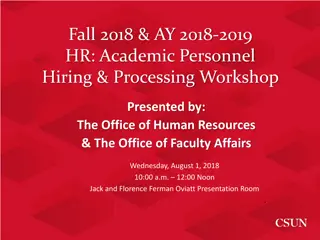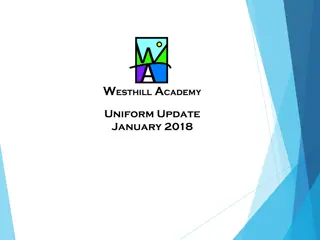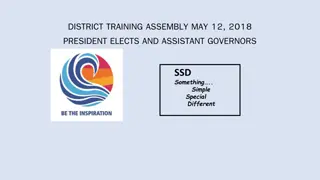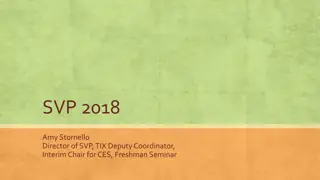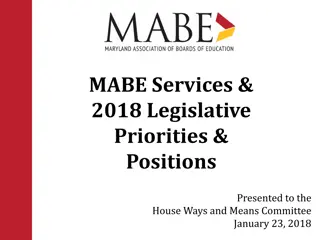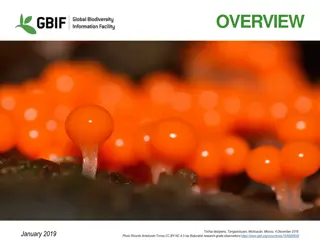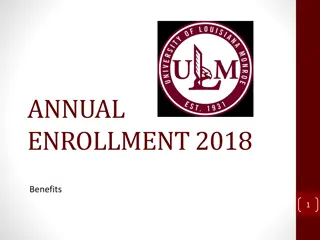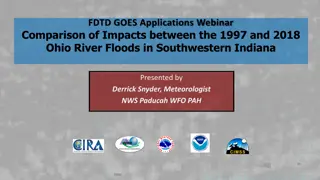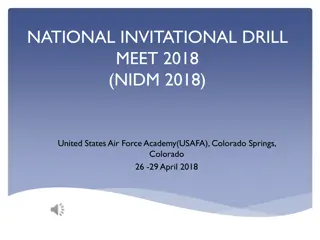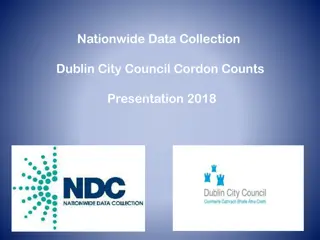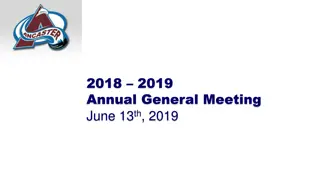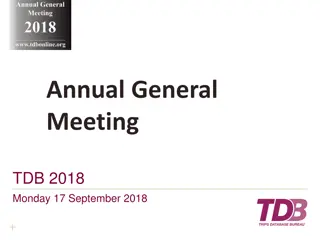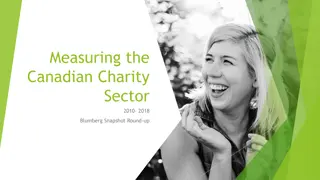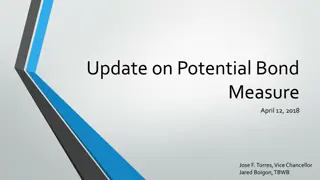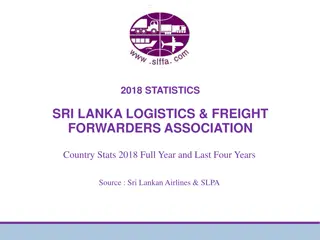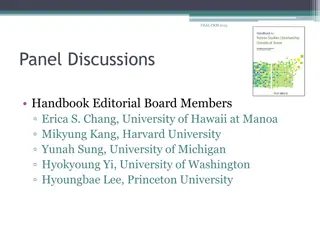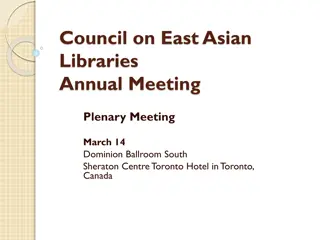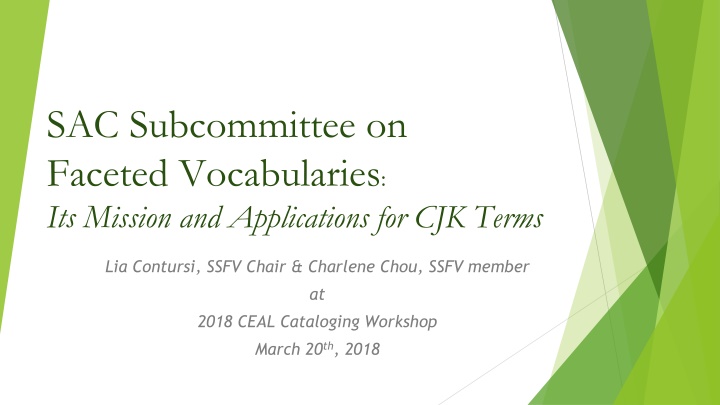
Towards Full Implementation of Library of Congress Faceted Vocabularies
Explore the mission and applications of the SAC Subcommittee on Faceted Vocabularies for CJK terms. Delve into the white paper responses from various organizations and the proposing of CJK terms. Recommendations include the implementation of bibliographic records with genre and demographic facets. Discover the displaying of granular facets in MARC Bib and Auth formats.
Download Presentation

Please find below an Image/Link to download the presentation.
The content on the website is provided AS IS for your information and personal use only. It may not be sold, licensed, or shared on other websites without obtaining consent from the author. If you encounter any issues during the download, it is possible that the publisher has removed the file from their server.
You are allowed to download the files provided on this website for personal or commercial use, subject to the condition that they are used lawfully. All files are the property of their respective owners.
The content on the website is provided AS IS for your information and personal use only. It may not be sold, licensed, or shared on other websites without obtaining consent from the author.
E N D
Presentation Transcript
SAC Subcommittee on Faceted Vocabularies: Its Mission and Applications for CJK Terms Lia Contursi, SSFV Chair & Charlene Chou, SSFV member at 2018 CEAL Cataloging Workshop March 20th, 2018
Agenda SAC Subcommittee on Faceted Vocabularies White paper & responses from PCC, OCLC, CC:DA and NLM CJK or non-English perspectives Proposing CJK terms: lessons learned Group discussion
SAC Subcommittee on Faceted Vocabularies Lia Contursi, SSFV Chair
SAC Subcommittee on Genre/Form Implementation Advisory Working Group to PSD for creation and implementation of: Library of Congress Genre/Form Terms (LCGFT) LC Law Genre/Form Terms LC Music Genre Terms LC Literature Genre/Form Terms LC General Genre/Form Terms LC Medium of Performance (LCMPT) LC Art Genre/Form Terms In the meantime PSD created the Library of Congress Demographic Group Terms (LCDGT)
SAC Subcommittee of Genre Form Implementation SAC Subcommittee on Faceted Vocabularies
A Brave New (Faceted) World: Towards Full Implementation of Library of Congress Faceted Vocabularies White paper promoting full scale implementation of the non-topical faceted vocabularies Responses received from : OCLC PCC CC:DA NLM
Recommendations: Implementation of bibliographic records where genre and demographic facets are appropriate. Full level implementation of work level and expression level authority records for works that are likely to embody multiple manifestations and for all name authority records.
Displaying of granular facets in: MARC Bib.: 046, 370, 382, 385, 386, 388, 655 046 Date of item information 370 A place associated with works and expressions, including place of origin. 382 Medium of performance 385 Audience characteristics 386 Creator/contributor characteristics 388 Time period of creation term 655 Genre/form MARC Auth.: 046, 370, 374, 375, 380, 382, 385, 386 046 Special coded dates 370 Associated place 374 Occupation 375 Gender 380 Form of work 382 Medium of performance 385 Audience characteristics 386 Creator/contributor characteristics
No clear instructions on the use of genre or demographic terms Library of Congress-Program for Cooperative Cataloging Policy Statements (LC-PCC PS) PCC RDA BIBCO Standard Record (BSR) Descriptive Cataloging Manual Z1 : Name and Series Authority Records (DCM Z1) MARC 21 Format for Bibliographic Data (MARC 21 Bibliographic) MARC 21 Format for Authority Data (MARC 21 Authority)
AALL decisions on LCGFT and LCDGT Appropriate use of LCGFT in bibliographic records but no LCDGT, preferably extensive use of LCDGT in authority records 110:1 :$a Japan. $t [name of law] 380: :$a Statutes and codes $2 lcgft 110:1 :$a China. $t [name of law] 380: :$a Treaties $2 lcgft 100:1 :$a Alcorta, Joe H. $q(Joe Hermenegildo), $d1939- $t Essential Spanish for policemen, lawyers, and judges 385: :$a Police $2 lcdgt 385: :$a Lawyers $2 lcdgt 385: :$a Judges $2 lcdgt 385: :$a English speakers $2 lcdgt
Application of LCGFT Statutes and codes in Japanese resources (just an example) : Statutes, laws, acts of the Diet : Regulations, rules : Orders : Cabinet orders Statutes and codes // Scope note: (This heading is used as a genre/form heading for texts of individual laws as well as codes and compilations of laws passed by a legislature. Laws enacted during a particular session or sessions are entered under Session laws. Examples: 1. France s Code civil 2. Oregon revised statutes annotated) Municipal ordinances // Scope note: (Example: General orders and ordinances of the Board of Supervisors, city and county of San Francisco) Administrative regulations // Scope note: (This heading is used as a genre/form heading for rules made by administrative agencies under the authority delegated by statute. Examples: 1. Code of federal regulations 2. Halsbury s statutory instruments) 455: : Subordinate legislation. 455: : Administrative agency regulations
Gender terms/Language terms 375: :$a Males $2 lcdgt 375: :$a Females $2 lcdgt 377: :$a jpn What to do? Is it perceived as violation of privacy? Demonyms? [LC moratorium]
A different type of controlled vocabulary: relator terms in the Toolkit $e author $e editor $e editorial director etc. Many roles in Japanese bibliographic language do not seem to correspond to the English relator terms. Ex.: : [Planner] = Editor? Editorial director? Ex.: , = Editor? Compiler? Editing group? Sometimes - seems to indicate more a creator than a contributor. Do we need best practices?
CJK or Non-English Perspectives Charlene Chou SSFV member & CTP Chair
Charlenes feedback (1) Both CC:DA and OCLC mentioned about non-English vocabularies In addition to full implementation of LCGFT/LCDGT, will the scope of our group be expanded to non-English vocabularies or multilingual thesauri such as AAT? Do we need to review the IFLA survey on Genre Form Practices in National Libraries as a reference document? Seek partnerships to do pilot tests (NLM), usability studies and focus group studies (OCLC), etc. Phase 1: to solicit more partnerships, to collect more use cases and doing usability studies before full implementation? OCLC would be an important partner for full implementation. When I asked OCLC if they plan to control other faceted vocabularies (e.g. Getty s AAT) in Connexion during the Virtual AskQC office hours on 1/31, they said it s on their short list and may talk to Getty in the near future.
Charlenes feedback (2) For art terms Do we need to propose a new art term for LCGFT if a term exists in AAT already? According to the LC memo, LC proposals represent broad categories of artistic and visual works and can be readily used in general libraries that need to provide high-level genre/form access to their collections of visual works. They do not attempt to replicate the breadth and depth of specialized vocabularies such as the Thesaurus for Graphic Materials and the Art & Architecture Thesaurus. The definitions of broad categories and general libraries are quite vague and impractical for catalogers, in my opinion. I will propose using an existing AAT term rather than proposing a new LCGFT since AAT has clearly defined structures with multilingual terms/interface/linked data and is widely used in the international community already.
Proposing CJK Terms: LCSH, LCGFT & LCDGT Lessons learned
CJK Terms: Challenges Approved terms: with more efforts Scar literature (LCGFT) Romanized references: Shang hen wen xue; Shanghen wen xue; Shanghen literature, etc. Removed for the original proposal; modified version with more explanations: approved later 952 note added: Chinese language forms for this concept added as UFs because found in that form in English-language sources. Cf. GFTM J 190 sec. 7 7. Foreign terms. In general, do not add Ufs to genre/form terms from their equivalents in foreign languages. However, such references may be made from foreign words and phrases that are in widespread use in English-language reference sources. Example: Fairy tales UF M rchen Rejected terms: Manga vs. graphic novels (LCGFT) SACO disapproved manga s proposal before. Shall we try again? Will a manga researcher search by graphic novels rather than manga as a genre term?
CJK Terms: Challenges Rejected terms: Zhiqing vs. educated youth (LCDGT) Through CEAL colleagues support, Charlene sent LC a memo for their reconsideration to approve this demographic term. Zhiqing literature (LCGFT) Neo-realistic fiction (Xin xieshi xiaoshuo) (LCGFT) Web fiction (LCSH): not approved as a subject heading on 7/17/2017; using Fiction Electronic publishing or Serialized fiction Electronic publishing as appropriate A popular concept in China: Upcoming: Light novels (Japanese) a Japanese term for fiction aimed at middle school/high school students. It is a variation of young adult fiction but often published almost in a serial form. It is becoming more and more important because we will see adaptations done - anime, manga, light novel, live action film, possibly novel as well.
CJK Terms: Probable Solutions Mapping CJK terms RDA Registry for CJK relationship designators LCGFT, LCDGT, AAT, etc. Task groups to review and finalize terms for mapping Spreadsheets of relator terms to review: print & AV tables Strategies Phased implementation More controversial terms to be done in phase two with more deliberations with scholarly communities
Responses from the RSC Chair (1) Charlene s email to Diane Hillmann (RDA Registry) & RSC Chair: RDA translation projects do not solve the problem of mapping terms which are actually on the books for cataloging. Each RDA term is not in an one-to-one relationship to each language. Instead, each language may have multiple synonyms or related terms for that particular English term. Can CEAL map our CJK spreadsheets in the RDA Registry? Gordon Dunsire (RDA Steering Committee, Chair) The RDA Registry accommodates translations following basic Semantic Web principles and best practices. There are two methods: 1. Translation of the RDA vocabularies by an authorized agent; this can be a person or corporate body. For example, a national library and a professional organization such as CEAL are suitable corporate bodies, and selected individuals who are members of such bodies are suitable persons. The agent is asked to provide as many translations of element sets and vocabulary encoding schemes as possible, and usually only one agent is authorized for each translation. The RSC is aware that there are semantic issues associated with formal translations of the vocabularies. The RSC Translations Working Group, chaired by the RDA Translations Team Liaison Officer who is a member of RSC, is charged with consulting with translators and making recommendations to the RSC on resolving issues of practice and principle. Issues relating to homonyms, examples, and gender were discussed at a translators' meeting during the RSC meeting in Madrid, Spain, in 2018 (http://www.rda-rsc.org/sites/all/files/RSC-Outcomes- 2017%20October.pdf). RDA accommodates synonyms in any language.
Responses from the RSC Chair (2) 2. Mappings and alignments between RDA vocabularies and vocabularies that are separately maintained and published. For example, RDA has maps (in RDF for linked data) between RDA element sets and value vocabularies and ISBD, the RDA/ONIX Framework for Resource Categorization, and the MARC 21 relator codes (http://www.rdaregistry.info/Maps/). The RSC prefers that there is agreement on the mappings with the owners of the external vocabulary, for example via a protocol. Mappings use RDFS and SKOS properties for matching vocabulary semantics. If the external vocabulary does not have an RDF representation, an alignment suitable for cross-walks can be published (http://www.rdaregistry.info/Aligns/). The RDA Registry has a partial Chinese translation, supplied as a test by Ben Gu of the National Library of China. This translation is now out of date. Ben Gu is a new member of the RDA Board, representing a national institution in the RDA Asia region (http://www.rda-rsc.org/node/433). There is no Japanese or Korean translation. CEAL should approach the RDA Translations Team Liaison Officer, Daniel Paradis, if it wishes to associate a translation with RDA, or to participate in the work of the RSC Translations Working Group. The RSC and the working group are interested in translation issues for specific languages and cultures. Note that the RDA Registry can accommodate external vocabularies, using the Open Metadata Registry, if required for method 2. Note also that RDA is designed to be extensible, so that culture or material-specific characteristics and relationships can be accommodated. RIMMF synchronizes with releases of RDA Vocabularies on GitHub, so any translations are automatically included (https://github.com/RDARegistry/RDA-Vocabularies/releases).
Group Discussion Thank you!

